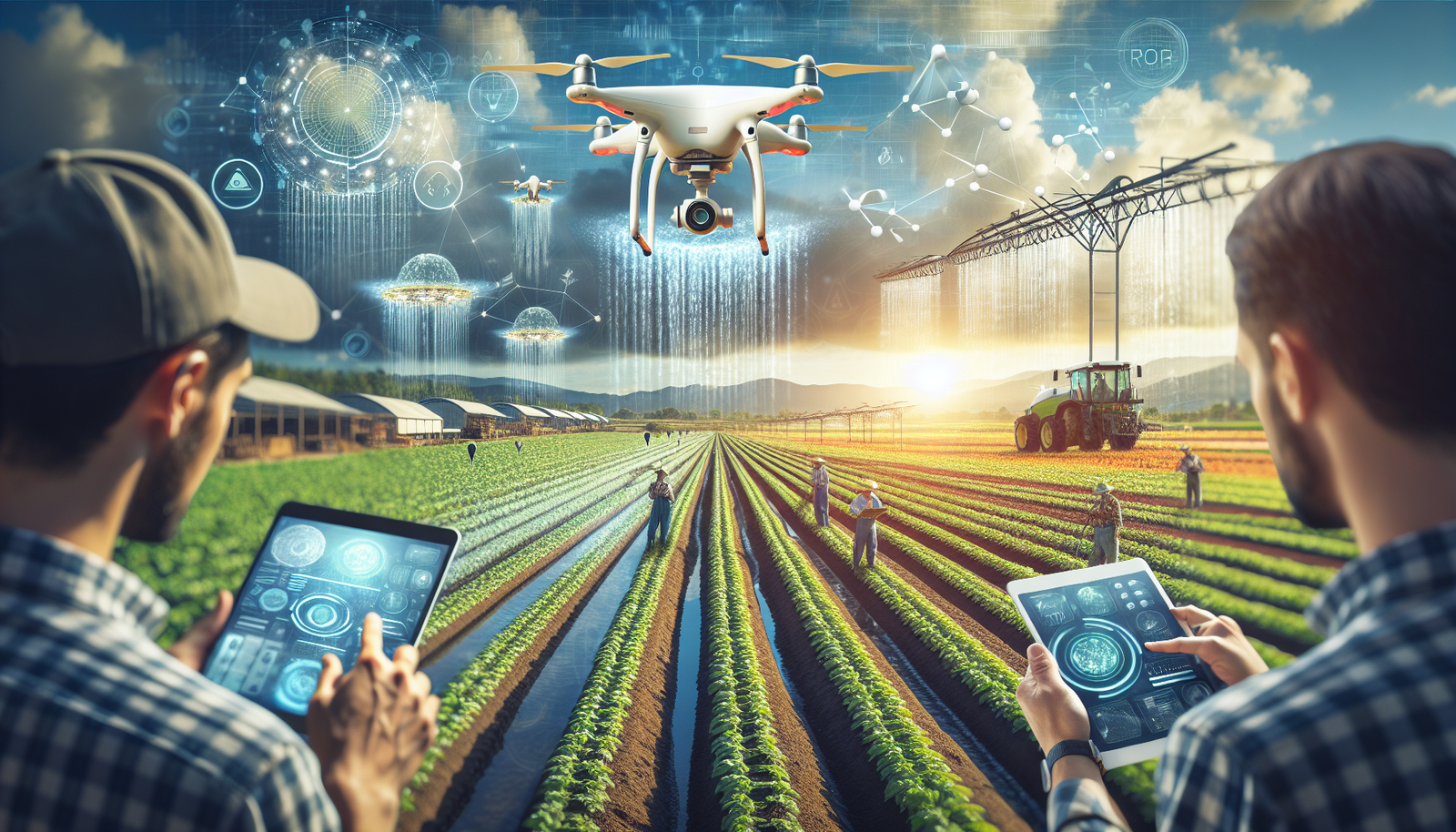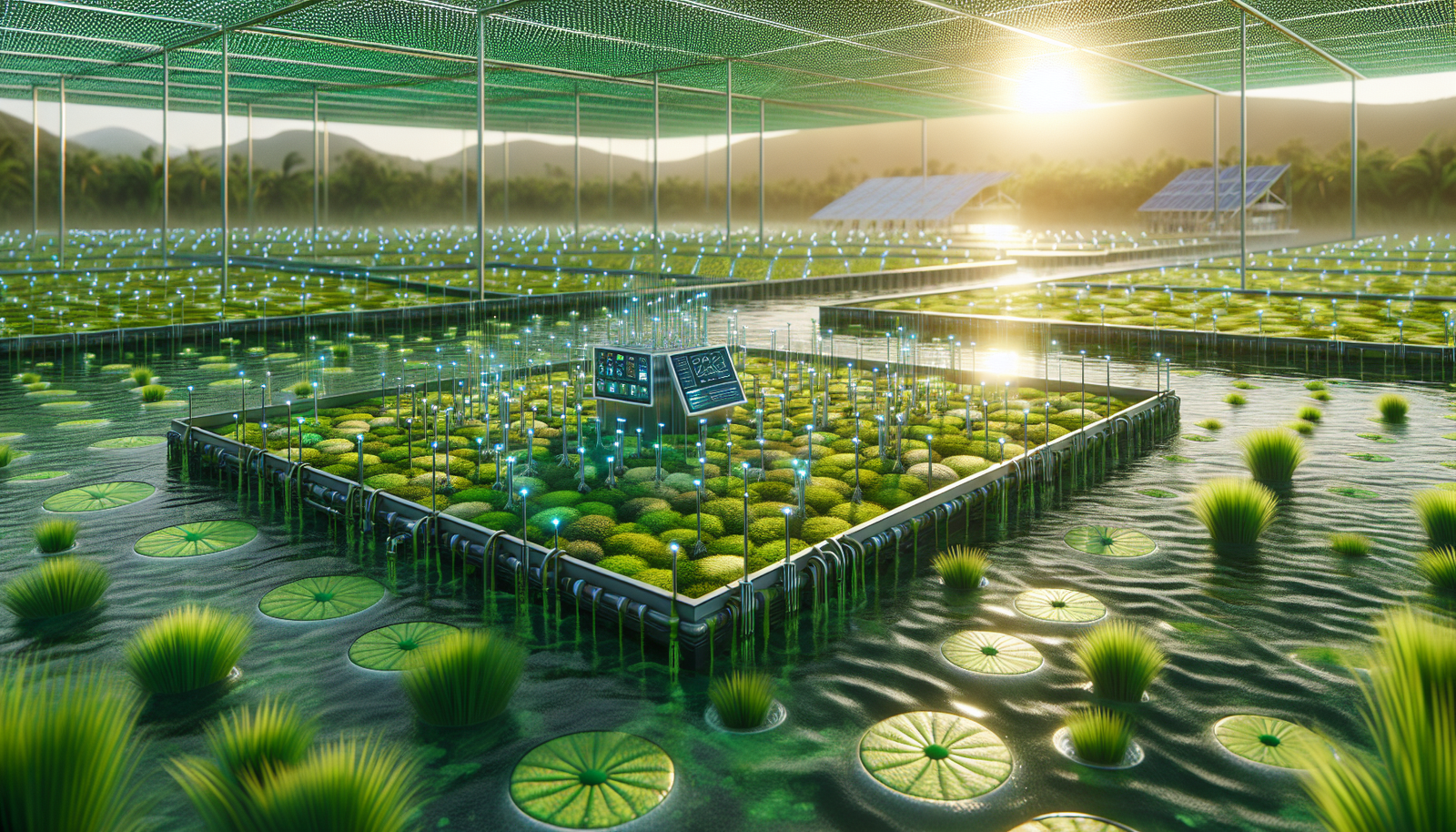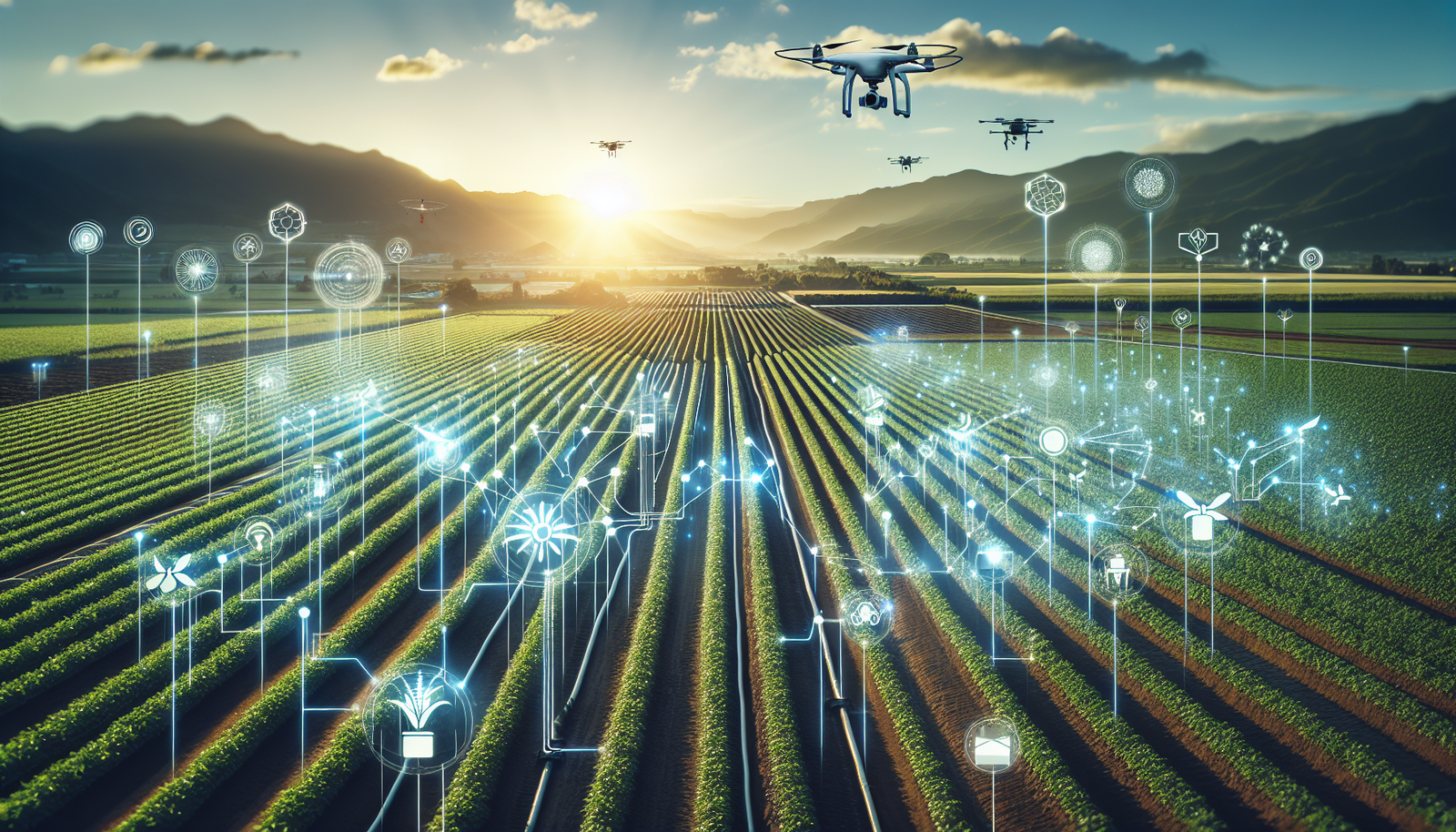The Role of AI in Modern Agriculture
Artificial Intelligence (AI) is playing a pivotal role in reshaping the agricultural landscape, offering innovative solutions to age-old challenges. By integrating AI technologies, farmers can enhance their productivity and efficiency, leading to more sustainable farming practices. One of the most significant contributions of AI in this field is its ability to analyze vast amounts of data, providing insights that were previously unattainable. This data-driven approach enables precision farming, allowing farmers to optimize the use of resources such as water, fertilizers, and pesticides.
AI technologies facilitate real-time monitoring and predictive analytics that are crucial for modern agriculture. Through the use of sensors and drones, AI systems can collect data on crop health, soil conditions, and weather patterns. This information is then processed to predict crop yields and identify potential issues before they become severe problems. Such proactive measures not only help in reducing waste but also in minimizing the environmental impact of agricultural activities.
Moreover, AI is instrumental in automating various farming processes, thereby reducing the reliance on manual labor and improving operational efficiency. Robotics powered by AI can perform tasks such as planting, watering, and harvesting with precision and speed. This automation not only alleviates labor shortages but also ensures that farming activities are conducted with consistency and accuracy.
To illustrate the impact of AI in agriculture, consider the following data visualizations:
| AI Application | Impact |
|---|---|
| Precision Farming | Reduces resource usage by 30% |
| Crop Monitoring | Increases yield prediction accuracy by 20% |
| Automated Harvesting | Decreases labor costs by 25% |
In conclusion, the integration of AI in agriculture represents a transformative step towards achieving global food security and fostering environmental sustainability. By leveraging AI technologies, the agricultural sector can address some of the most pressing challenges it faces today, ensuring a more resilient and sustainable future.
Precision Farming: Enhancing Efficiency
Precision farming is a transformative approach in modern agriculture, leveraging AI technologies to optimize the efficiency of farming practices. By utilizing data from various sources such as satellite imagery, drones, and IoT devices, farmers can make informed decisions that minimize waste and maximize yield. This method not only enhances productivity but also contributes to sustainable agricultural practices.
An essential component of precision farming is the use of AI-driven analytics to monitor crop health and soil conditions. This is achieved through sophisticated algorithms that process data in real-time, enabling farmers to apply the right amount of water, fertilizers, and pesticides precisely where and when they are needed. Such targeted interventions can lead to a reduction in resource usage by up to 30%, significantly lowering the environmental impact of farming activities.
The following table illustrates some of the key technologies used in precision farming and their benefits:
| Technology | Function | Benefits |
|---|---|---|
| Satellites and Drones | Remote sensing of crop conditions | Allows for early detection of crop diseases and nutrient deficiencies |
| IoT Sensors | Monitoring soil moisture and weather conditions | Enables efficient water usage and better crop management |
| AI Algorithms | Data analysis and predictive modeling | Improves decision-making and reduces input costs |
Furthermore, precision farming supports global food security by enabling farmers to produce more with less. As the global population continues to rise, the demand for food increases, making it imperative to enhance the efficiency of food production systems. AI technologies in precision farming help address this challenge by ensuring that every square meter of farmland is used to its fullest potential, thus contributing to a stable and secure food supply chain.
AI-Powered Crop Management
AI-powered crop management is revolutionizing the way farmers monitor and manage their crops, resulting in increased productivity and sustainability. By leveraging advanced technologies such as machine learning and computer vision, AI systems can analyze vast amounts of data collected from various sources like drones, sensors, and satellites. These insights allow farmers to make informed decisions about irrigation, fertilization, and pest control, ultimately enhancing crop yield and reducing resource waste.
One of the key components of AI-powered crop management is precision agriculture, which employs AI algorithms to provide real-time insights into the health and needs of crops. Precision agriculture enables farmers to apply water, fertilizers, and pesticides more precisely, reducing environmental impact and lowering costs. For instance, AI systems can detect nutrient deficiencies in plants early on, allowing for timely interventions. This targeted approach not only improves the health of crops but also minimizes the use of chemicals, promoting a more sustainable agricultural practice.
| AI Technology | Application | Benefits |
|---|---|---|
| Machine Learning | Predictive analysis for crop yield | Optimizes planting schedules; reduces waste |
| Computer Vision | Monitoring crop health | Early detection of diseases and pests |
| Sensor Networks | Soil moisture management | Efficient water usage; prevents over-irrigation |
Furthermore, AI-powered crop management involves the integration of automated systems that can perform various agricultural tasks without human intervention. Automated machinery equipped with AI can plant, weed, and harvest crops with high precision, reducing labor costs and improving operational efficiency. This aspect of AI technology is particularly beneficial for large-scale farms where manual labor is not feasible for managing extensive fields. As these technologies advance, they promise to transform the agricultural landscape by making farming more efficient, sustainable, and capable of meeting the growing global demand for food.
Sustainable Water Usage through AI
Artificial Intelligence (AI) is paving the way for sustainable water usage in agriculture, addressing one of the most critical resources for crop production. By leveraging AI technologies, farmers can optimize water use, reducing wastage and enhancing crop yield. The integration of AI-driven systems enables the monitoring of soil moisture levels, weather forecasts, and crop health, allowing for precise irrigation scheduling. This precision not only conserves water but also ensures that crops receive the exact amount of water they need for optimal growth.
Advanced AI algorithms analyze a multitude of data points to provide actionable insights. For instance, AI can process satellite imagery and sensor data to evaluate the condition of thousands of acres of farmland. This information is crucial in identifying areas that require more or less water, thus preventing over-irrigation and under-irrigation. Moreover, AI systems can predict drought conditions, enabling farmers to make informed decisions on water management strategies. These capabilities translate into significant water savings, with studies showing a reduction in water usage by up to 30% in AI-assisted farms.
AI-powered irrigation systems often incorporate machine learning models that continuously improve their predictions and recommendations. These models assess historical and real-time data to refine irrigation schedules. Additionally, the adoption of AI in water management supports sustainable practices by promoting the efficient use of resources. Farmers can receive notifications and alerts through mobile applications, ensuring they can make real-time adjustments to their irrigation practices. This seamless integration of technology into everyday farming operations exemplifies the potential of AI to transform traditional agricultural methods.
Overall, the implementation of AI in sustainable water usage is a significant step towards achieving global food security and environmental conservation. By minimizing water waste and maximizing crop productivity, AI not only supports farmers in managing their resources efficiently but also contributes to the broader goals of sustainability and environmental stewardship. As AI technology continues to evolve, its role in sustainable agriculture will likely expand, offering new solutions to some of the most pressing challenges in water management.
AI in Pest and Disease Control
Artificial Intelligence is playing a crucial role in revolutionizing pest and disease control in agriculture, thereby enhancing sustainability and food security. By utilizing machine learning algorithms and data analytics, AI systems are now capable of accurately predicting pest outbreaks and identifying diseases at an early stage. This early detection allows farmers to take timely action, reducing crop losses and minimizing the need for chemical interventions. The integration of AI in pest control not only helps in preserving the environment but also ensures healthier produce for consumers.
One of the key advantages of AI in pest and disease control is its ability to process vast amounts of data collected from various sources. Sensors deployed in fields gather real-time information about crop health, weather conditions, and pest activity. This data is analyzed by AI models to identify patterns and predict potential threats. For instance, an AI system can analyze temperature and humidity data to predict the likelihood of a pest outbreak. Farmers can then implement targeted interventions, such as deploying natural predators or using organic pesticides, to mitigate the risk.
AI technologies also facilitate precision agriculture, allowing for more efficient use of resources. Drone technology equipped with AI capabilities can survey large agricultural areas, capturing high-resolution images that are analyzed to detect signs of disease or pest infestation. This enables farmers to apply treatments only where necessary, reducing the overuse of chemicals and promoting sustainable farming practices. Moreover, AI-driven pest control systems can be integrated with farm management software to provide actionable insights, enhancing decision-making and operational efficiency.
| Benefits of AI in Pest and Disease Control | Impact on Agriculture |
|---|---|
|
|
Soil Health and AI Innovations
Soil health is a critical component in agriculture that directly impacts crop yield and quality. With the advent of AI technologies, farmers and agronomists are now equipped with powerful tools to analyze and enhance soil conditions. AI-driven solutions can process large datasets from soil samples, satellite imagery, and weather patterns to provide detailed insights into soil composition, moisture levels, and nutrient availability. This allows for more precise application of fertilizers and irrigation, ensuring that crops receive exactly what they need to thrive without overuse of resources.
One of the primary innovations in this area is the use of AI-powered sensors and IoT devices that continuously monitor soil health in real-time. These sensors collect data on various parameters such as pH levels, temperature, and organic matter content. The data is then analyzed using machine learning algorithms to predict potential issues and suggest remedial actions. This proactive approach not only saves time and resources but also enhances the sustainability of farming practices by reducing chemical inputs and conserving water.
Moreover, AI technologies support the creation of soil health maps, which offer a visual representation of soil conditions across large tracts of land. Farmers can utilize these maps to identify areas that require attention and tailor their management practices accordingly. For instance, AI can help in identifying zones within a field that are underperforming due to poor soil health, allowing for targeted interventions. This level of precision in soil management contributes significantly to improving crop productivity and promoting sustainable agricultural practices.
| AI Innovation | Benefit |
|---|---|
| AI-powered Sensors | Real-time monitoring of soil parameters |
| Machine Learning Algorithms | Predictive analysis and proactive soil management |
| Soil Health Maps | Visual representation of soil conditions for targeted intervention |
AI in Supply Chain Optimization
Artificial Intelligence (AI) plays a pivotal role in optimizing agricultural supply chains, ensuring that food products are delivered efficiently from farm to table. By leveraging AI technologies, farmers and distributors can significantly reduce waste, forecast demand more accurately, and streamline operations. AI algorithms analyze historical data and current market trends to predict consumer demand, helping farmers and suppliers adjust their production schedules accordingly. This helps in reducing overproduction and ensuring that resources are utilized efficiently.
Benefits of AI in Supply Chain Optimization:
- Reduced Waste: AI systems can identify patterns in supply chain disruptions, allowing for proactive measures to prevent spoilage and loss.
- Improved Forecasting: Machine learning models analyze vast amounts of data to predict future trends, helping producers align their output with market needs.
- Enhanced Efficiency: Automation of logistics and inventory management through AI reduces manual errors and speeds up processes.
AI also contributes to enhancing transparency within the agricultural supply chain. By implementing AI-driven tracking systems, stakeholders can monitor the movement of goods at every stage, from harvesting to retail. This transparency not only builds trust with consumers but also helps in ensuring compliance with food safety regulations. Moreover, AI can assist in optimizing transportation routes, reducing fuel consumption and carbon footprint, which is crucial for sustainable agriculture practices.
AI-Enabled Supply Chain Optimization Metrics:
| Metric | Pre-AI Implementation | Post-AI Implementation |
|---|---|---|
| Average Waste Reduction | 15% | 30% |
| Forecast Accuracy | 70% | 90% |
| Operational Efficiency Gain | 5% | 20% |
As AI continues to advance, its integration into supply chain optimization will become even more sophisticated. Future developments may include the use of AI for real-time adjustments in production and distribution based on live data feeds from IoT devices and satellite imagery. This will enable a more resilient and responsive agricultural supply chain capable of adapting to environmental changes and market fluctuations, ultimately contributing to global food security and sustainability.
AI and Climate-Resilient Agriculture
As the global climate continues to change, agriculture faces unprecedented challenges. AI technologies are playing a pivotal role in developing climate-resilient agricultural practices. By leveraging large datasets and predictive analytics, AI can help farmers anticipate weather changes and adapt their strategies accordingly. For instance, AI-driven models can predict droughts, allowing farmers to adjust their irrigation practices in advance, thereby conserving water and reducing waste.
Beyond predicting weather patterns, AI is instrumental in crop management and monitoring. Machine learning algorithms analyze satellite imagery and sensor data to provide real-time insights into crop health. This information enables farmers to make informed decisions, optimizing the use of fertilizers and pesticides. Such precision agriculture techniques not only enhance crop yield but also minimize the environmental impact, promoting sustainable farming practices.
In addition to individual farm management, AI contributes to broader agricultural policies. Governments and organizations use AI to analyze climate data and forecast agricultural trends, shaping policies that support climate-resilient agriculture. These AI-driven insights ensure that resources are allocated efficiently, and emergency response mechanisms are in place to mitigate the effects of extreme weather events.
| AI Application | Benefit |
|---|---|
| Weather Prediction | Enables proactive water and resource management |
| Crop Health Monitoring | Optimizes input use and enhances yield |
| Policy Support | Guides resource allocation and emergency planning |
In conclusion, AI is not just a tool for enhancing productivity; it is a critical component in building a resilient agricultural system that can withstand the challenges posed by climate change. By integrating AI technologies, the agriculture sector can move towards a more sustainable and secure future.
Challenges and Ethical Considerations
Artificial Intelligence (AI) is undoubtedly transforming agriculture, but it is not without its challenges and ethical considerations. As AI technologies become more integrated into farming practices, there are several obstacles that need to be addressed to ensure equitable and sustainable implementation. One major challenge is the digital divide that exists between different regions and communities. Access to AI technology and the internet is significantly limited in many rural and underdeveloped areas, which can exacerbate existing inequalities in agricultural productivity and economic opportunity.
Moreover, the use of AI in agriculture raises ethical concerns regarding data privacy and ownership. Farmers generate vast amounts of data through AI-powered tools such as drones, sensors, and smart tractors. However, questions arise about who owns this data and how it is used. There is a risk that large agribusinesses could exploit this data, leading to a concentration of power and information that disadvantages smallholder farmers. To address these concerns, it is crucial to establish clear regulations and policies that protect farmers’ rights and ensure fair data practices.
In addition to privacy issues, there are environmental and societal impacts to consider. While AI has the potential to enhance sustainability by optimizing resource use, there is also a risk that it could lead to over-reliance on technology and reduce biodiversity. For instance, AI-driven monoculture practices may increase efficiency but at the cost of environmental health. It is essential to balance technological advancement with ecological preservation to avoid long-term negative consequences.
Finally, the ethical deployment of AI in agriculture must consider the impact on labor markets. Automation and AI can potentially displace farmworkers, leading to job losses and economic disruption in rural communities. To mitigate these effects, there should be efforts to retrain workers and create new employment opportunities in the tech-driven agricultural sector. A collaborative approach involving governments, businesses, and communities is necessary to ensure that AI serves as a tool for positive change rather than a source of inequality.
Future Prospects of AI in Agriculture
The future of AI in agriculture is poised to bring unprecedented changes to the way food is produced and distributed globally. Artificial intelligence has the potential to address some of the most pressing challenges faced by the agricultural sector, including climate change, resource scarcity, and the need for increased productivity. By integrating advanced machine learning algorithms and data analytics, AI can enhance crop management, optimize resource utilization, and minimize environmental impact.
Several prospects in AI-driven agriculture include the development of intelligent systems for precision farming. These systems leverage data from various sources such as satellite imagery, weather forecasts, and soil sensors to provide farmers with actionable insights. Precision farming enables farmers to apply the right amount of water, fertilizers, and pesticides at the right time, significantly reducing waste and promoting sustainability. Additionally, AI-powered drones and autonomous tractors are being developed to carry out tasks such as planting, monitoring, and harvesting crops with increased efficiency and accuracy.
The potential of AI in agriculture also extends to improving supply chain management. AI algorithms can predict market demand, optimize logistics, and reduce food waste by facilitating better decision-making throughout the supply chain. This will not only enhance food security but also contribute to the reduction of greenhouse gas emissions associated with food production and distribution. Furthermore, AI can assist in the development of new crop varieties that are more resilient to climate change, pests, and diseases, ensuring a stable food supply in the face of global environmental challenges.
Despite the promising advancements, the integration of AI in agriculture also presents ethical and practical challenges. The adoption of AI technologies may lead to concerns about data privacy, job displacement, and the digital divide between small-scale and large-scale farmers. It is crucial to address these issues through inclusive policies and frameworks that ensure equitable access to AI technologies for all stakeholders. By fostering collaboration between governments, research institutions, and the private sector, the future of AI in agriculture can be navigated responsibly, ensuring that its benefits are shared widely across the globe.



